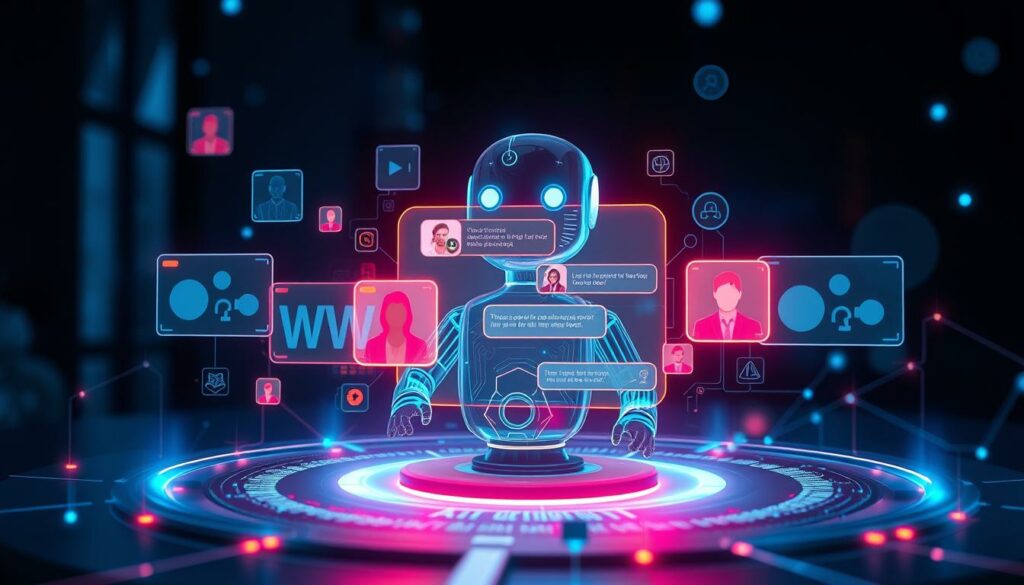Artificial Intelligence (AI) is now a key part of improving customer service. The Zendesk Customer Experience (CX) Trends Report 2024 shows that 65 percent of CX leaders believe AI is essential. They’re not just changing old ways but starting a revolution.
AI tools like chatbots and machine learning make customer service better. They offer personalized, quick, and efficient help. This matches what users hope for and cuts costs a lot, making the experience better for everyone.
Key Takeaways
- 65% of CX leaders recognize AI as a strategic necessity in customer experience strategies.
- 51% of consumers prefer interacting with bots for immediate service.
- Zendesk AI has helped Liberty London save 220 hours per month by eliminating manual triage.
- AI-powered tools can automate low-value tasks, thereby reducing operational costs.
- Utilizing AI can help businesses manage increased ticket volumes without increasing spending.
- AI can help create a chatbot persona that matches a brand’s identity, increasing customer satisfaction.
- Zendesk WFM uses predictive AI-powered forecasting to generate staffing forecasts based on historical data.
Introduction to AI in Customer Experience
Businesses today need to serve customers efficiently and effectively. Artificial intelligence (AI) has become a key player in improving how companies interact with customers. With the help of AI, businesses can provide fast, personalized service.

The Growing Need for AI Solutions
About 65% of leaders in customer service believe AI is vital for better interactions. The market is changing fast, making AI essential for staying ahead. Companies are using AI in many ways to make customer service better, like:
- Predictive analytics that forecast customer needs and trends, allowing proactive service.
- Real-time sentiment tracking, which enables companies to respond promptly to feedback across multiple channels.
- AI-driven sentiment analysis to decipher customer emotions and feedback, improving overall engagement.
- Predictive maintenance that helps foresee problems and address them before they escalate, thus enhancing customer trust.
Intercom’s report from 2023 shows that 69% of support leaders want to spend more on AI next year. Companies like Total Synergy and Hospitable are using AI chatbots to improve support. McAfee used AI chatbots and saw a big jump in how many customer issues could be resolved without human help.
How AI is Revolutionizing Customer Service
AI is making a huge difference in customer service. Let’s look at some key facts:
- Google saw a 7 times increase in AI projects, showing more companies are using AI.
- Microsoft noted a big jump in AI use across different fields.
- According to a 2023 Accenture report, AI chatbots could change up to 40% of work hours across industries.
- 68% of consumers like how fast AI chatbots can answer them, showing that quick help is valued.
- Intercom’s report says companies using AI for personalized support see more customer happiness and loyalty.
AI lets businesses improve service in many ways, like tracking sentiments in real-time and using predictive analytics. This helps companies stand out. They can keep their customers happier and more loyal, creating a great customer experience.
Understanding AI Agent Technology
AI agents are changing customer service using smart machine learning. They learn from customer actions. These systems range from simple auto-replies to advanced technologies. They are key for businesses wanting better efficiency and to engage customers more.
Types of AI Agents
There are different AI agents used in customer support:
- Rule-Based Agents: These agents follow set rules. They handle FAQs and simple info requests well.
- Conversational AI: Thanks to NLP, these bots talk like humans, boosting customer happiness. An ai chatbot for improved customer satisfaction can manage complex questions well.
- Generative AI Agents: With Large Language Models (LLMs), they create responses that seem human. This makes chats more personal.
- Autonomous AI Agents: They make decisions on their own by analyzing data in real-time. This helps make customer service smoother.

Benefits of Using AI Agents
Using AI agents in customer service has many benefits:
- Enhanced Efficiency: AI solutions like ai customer support solutions quickly solve problems. They provide right info and know what customers need ahead of time.
- Cost Reduction: Automating simple tasks saves a lot of money. It lets human agents tackle harder problems.
- Improved Customer Engagement: AI agents offer personalized help anytime. This makes customers happier. Zendesk’s report shows 75% of people think generative AI will change how we interact with customers.
| Statistic | Details |
|---|---|
| TaskRabbit’s Expansion | They got 60% more customer service requests when growing into new countries, hitting 158,000 requests a month. |
| Future Preferences | 53% of folks prefer talking to AI agents for fewer mistakes. |
| Autonomy | In the future, 80% of questions might be solved without humans. |
| Generative AI | 69% of businesses think generative AI makes digital chats feel more human. |
The data shows AI agents meet customer needs well and fit into future service plans. This brings big benefits to businesses.
Enhance Customer Experience with AI Agent
Using AI agents helps make customer interactions better. These agents offer insights that make dealing with customers more personal. For example, they can spot patterns in behavior. This can lead to a shopping experience that keeps customers coming back. After all, sixty percent of customers are more likely to buy again if they get a personalized session.
Also, 62% of customers like AI chatbots more than waiting 15 minutes to talk to a person. This shows how important fast help is for keeping customers. Solving problems quickly can make customers 2.4 times more loyal. This shows how AI can really improve customer service.
But AI doesn’t just help with talking to customers. It can take care of tasks like writing down calls, summarizing meetings, and sending follow-up emails. This makes things more efficient and lets agents tackle harder problems. Agents get better at their jobs with AI’s real-time feedback, which improves service quality.
Product tips from AI can make up to 31% of online store sales. Using AI to tailor content for customers can make their experience even better. AI lets shoppers find what they need any time, which could mean more sales and happier customers.
The big move towards AI is clear, with 99% of top companies investing a lot in it. Companies that use AI well often see happier customers. For example, AI helps some companies quickly fix complaints.
Here’s a quick overview of the impact of AI on customer engagement:
| Key Metric | Impact |
|---|---|
| Repeat Purchase Likelihood | 60% increase after a personalized experience |
| Consumer Preference | 62% prefer AI chatbots over long wait times |
| E-Commerce Revenue Contribution | 31% from AI-based product recommendations |
| Customer Loyalty | 2.4x increase due to quick issue resolution |
| AI Adoption in Companies | 99% of Fortune 1000 companies investing in AI |
Using AI for customer service is a smart way to draw people in with AI tech. It’s not just about making people happy. It also builds loyalty and trust in the brand. This creates a better and more trustworthy customer service space.
AI Agent Applications in Real-World Scenarios
AI agents are making big differences in many fields. They make customer service better and operations more efficient. Using virtual AI assistants, businesses solve frequent problems. They offer quick and effective solutions.
Case Study: AI in Retail Customer Support
AI has changed retail in big ways. Amazon’s AI helps it suggest products you might like. This boosts its earnings a lot. E-commerce sites are also using AI to cut down on support requests by 65%. This makes customers happier and more loyal. Chatbots and assistants offer help any time. They make ordering simpler, like Domino’s Pizza chatbot does.
Case Study: AI in Financial Services
In finance, AI is key for better security and service. JP Morgan uses AI to catch fraud, saving a lot of money every year. PayPal’s AI keeps fraud way below the typical level. AI helps banks and others serve you faster and safer.
Learn more about real-world AI case studies.
Challenges and Solutions
But AI also comes with challenges. Keeping data safe and interactions personal are two big ones. We must use AI wisely and train it well. Tools like sentiment analysis let businesses understand and improve how they interact with you. This leads to better experiences for everyone.
| Industry | AI Application | Impact |
|---|---|---|
| Retail | Recommendation Systems | 35% Revenue Contribution (Amazon) |
| Financial Services | Fraud Detection | 70% Fraud Reduction (JP Morgan) |
| Logistics | Supply Chain Optimization | Enhanced Delivery Speed (DHL) |
| Manufacturing | Predictive Maintenance | 40% Downtime Reduction (Siemens) |
| Healthcare | Diagnostics | Greater Accuracy than Dermatologists (Google) |
Strategies to Implement AI-driven Customer Experience
Using ai-driven customer experience strategies requires knowing your business needs well. You should identify areas AI can help. This includes fixing long wait times and giving 24/7 support. AI lets companies automate replies and offer personalized advice. By using AI technologies like chatbots, businesses can handle many customer questions quickly. This ensures good service anytime.
It’s key to pick the right AI tools. AI customer service is powered by Natural Language Processing (NLP) and machine learning. For example, chatbots with NLP deal with various customer questions well. Machine learning helps the system learn from past interactions. Adding these technologies improves customer service a lot. It also lets human agents solve tougher problems, keeping a nice balance between machines and people.
Always checking and adjusting AI is vital. AI systems need updates to meet changing customer needs and business goals. Watch important numbers like response times and happiness scores to find where to get better. Making AI learn from real situations enhances its responses. Training staff to use AI tools also boosts teamwork between humans and AI. This brings a great customer experience, increasing loyalty and efficiency.
FAQ
What are AI agent solutions to enhance customer experience?
AI agent solutions use chatbots, virtual assistants, and machine learning. They make services personalized and quick. They meet what users expect.
What role does AI play in revolutionizing customer service?
AI changes customer service by upgrading old methods. It makes customer talks better and available all the time. This reduces waiting and predicts needs, serving users more effectively.
What types of AI agents are available for customer support?
There are many AI agents, from simple chatbots to complex machine learning systems. These can change based on what the customer does and their past talks.
What are the benefits of using AI agents in customer service?
AI in customer service makes things run smoother and cuts costs. It boosts customer interaction, offers round-the-clock support, and makes each interaction personal. This leads to happier customers.
How can AI-driven strategies enhance customer experience?
AI strategies make service more personal. They route questions smartly, support well during busy times, and give important insights for getting better.
What are some real-world applications of AI in customer support?
In retail, AI understands shopping habits and keeps the right stock. In finance, it helps with transactions and spotting fraud. This makes shopping better and banking safer and quicker.
What are the challenges and solutions related to AI in customer service?
Problems include worries about data safety and keeping a personal touch. Solutions are better AI training, using AI rightly, and mixing AI with human skills.
How can businesses implement AI-driven customer experience strategies?
To use AI, businesses must know their needs and pick suitable AI tools. They must train AI with the right data and blend it into current setups. Watching how it does and changing it as needed is key.



